Laws governing ballot measures in New Hampshire
This page provides an overview of resources addressing the laws and procedures that govern statewide and local ballot measures in New Hampshire, including constitutional amendments and campaign finance regulations.
- Types of ballot measures in New Hampshire
- Amending the New Hampshire Constitution
- Laws governing local ballot measures in New Hampshire
- Laws governing recall in New Hampshire
- Laws governing state constitutional conventions in New Hampshire
- Campaign finance requirements for New Hampshire ballot measures
- Changes to laws governing ballot measures in New Hampshire
Laws governing ballot measures in New Hampshire
Types of ballot measures in New Hampshire
- In New Hampshire, citizens do not have the power to initiate ballot measures at the state level.
- In New Hampshire, the legislature can refer constitutional amendments to the ballot.
- In New Hampshire, a total of 24 ballot measures appeared on statewide ballots between 1985 and 2024.
Amending the New Hampshire Constitution
- New Hampshire became a state in 1788. The current state constitution was ratified in 1783.
- The New Hampshire Constitution provides two mechanisms for amending the state's constitution—legislatively referred constitutional amendments and a state constitutional convention. A 60% vote is required during one legislative session for the New Hampshire State Legislature to place a constitutional amendment on the ballot. New Hampshire requires a two-thirds supermajority vote to approve constitutional amendments.
Laws governing local ballot measures in New Hampshire
- New Hampshire law requires an initiative process for charter amendments in home rule municipalities.
Laws governing recall in New Hampshire
- New Hampshire does not authorize the recall of elected officials.
Laws governing state constitutional conventions in New Hampshire
- According to the New Hampshire Constitution, a question about whether to hold a state constitutional convention is to automatically appear on the state's ballot every 10 years starting in 1972. New Hampshire is one of 14 states that provides for an automatic constitutional convention question.
Campaign finance requirements for New Hampshire ballot measures
- Under New Hampshire law, any group that supports or opposes a referendum is considered to be a political committee. A political committee must file a statement of organization with the New Hampshire Secretary of State within 14 days of forming, or within 24 hours of making an expenditure or receiving more than $500 in contributions, whichever comes first.
Changes to laws governing ballot measures in New Hampshire
- House Bill 228: Rep. Diane Pauer (R-Hillsborough 36) sponsored the legislation, which addressed petitioned articles at annual or special town meetings. Specifically, the bill establishes a process for designating a primary petitioner in written applications. If no primary petitioner is named, the first registered voter listed on the application is designated by default. The bill requires the moderator to provide the primary petitioner with at least 10 minutes to introduce the article at the meeting. The primary petitioner may also designate another registered voter to present the article by submitting written notice to the moderator. In the House and Senate, HB 228 was approved by voice vote.[1]
See also

Footnotes



